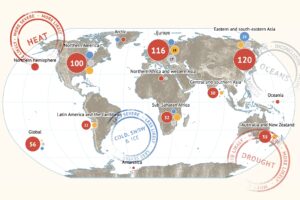This year marks a decade since nations successfully negotiated the Paris Agreement, a landmark treaty that has been the guiding force for international climate politics ever since.
Yet, with another round of negotiations looming at COP30 in November, there has been growing discontent with the UN climate process.
Critics say the talks are not doing enough to accelerate emissions cuts, tackle fossil fuels or raise climate funds for developing countries, among other concerns.
Influential figures in climate politics and civil society groups say COPs are in need of an “urgent overhaul” and have launched various manifestos for change.
This has been recognised by the Brazilian COP30 presidency, which has acknowledged the “growing calls for change” and asked parties to “reflect on the future of the process itself”.
All of this comes amid concerns about a “crisis” of multilateralism, widespread conflict and escalating climate hazards.
Carbon Brief asked 16 leading experts about how they think the UN climate talks could be reformed, including Christiana Figueres, Todd Stern, Prof Navroz K Dubash, Bernice Lee, Paul Watkinson, Dr Joanna Depledge, Dr Jennifer Allan, Sandrine Dixson-Declève and Li Shuo.
The contributors’ answers are presented via the thematic sections below.
- Has the Paris Agreement been a success?
- How could the negotiations themselves be improved?
- Can UN climate talks drive faster emissions cuts?
- How could COPs ensure broader accountability?
- Do UN climate talks need majority voting?
- What should the role of the COP presidency be?
- Do fossil-fuel companies have too much influence?
- Are COPs too big?
- How could COP participation be improved?
- How can COPs drive change outside the UN process?
Has the Paris Agreement been a success?
Todd Stern, former US special envoy for climate change: Paris has performed well in some respects, including strengthening both its temperature and emission goals in light of evolving science. It also led to a first global stocktake that called for tripling renewable energy and doubling energy efficiency by 2030 – and transitioning away from fossil fuels – in order to achieve net-zero emissions by 2050.
Bernice Lee, distinguished fellow and senior advisor at Chatham House: It can be hard to remember that the process remains one of the most successful multilateral endeavours in recent history. It has delivered what few thought possible: agreement among nearly 200 countries on a global issue that cuts to the core of national sovereignty, economic models and domestic politics. That the COP process delivered the Paris Agreement – and more recently, an agreement to transition away from fossil fuels – is no small feat. It is also easy to forget that, prior to Paris, the world was on track for a catastrophic 4-5C of warming. Today’s pledges, while still inadequate, have bent that curve closer to 2.5-3C – still unsafe, but a meaningful shift…Rather than dwelling on the system’s imperfections, the question is whether it can evolve, realistically and politically. Dismantling the current system is unlikely to yield a stronger or more equitable one with the authority to override national decisions. The current process, after all, emerged from the ruins of earlier failures.
Kaveh Guilanpour, vice president for international strategies at the Centre for Climate and Energy Solutions: In the aftermath of every COP, there are calls to reform the UNFCCC. But we should be aiming for an evolution, not a revolution, for three reasons. Firstly, a revolution would almost certainly not result in something stronger than we already have. It is hard to imagine that it would be possible to adopt the Paris Agreement in the current geopolitical and economic context. Secondly, the Paris Agreement is working, albeit not fast enough. Thirdly, and most importantly, the biggest barriers to the effective functioning of the UNFCCC and delivering on the Paris Agreement are deficiencies in the underlying politics. No amount of tweaking of the UNFCCC process can make up for that.
How could the negotiations themselves be improved?
Dr Monserrat Madariaga Gomez de Cuenca, environmental lawyer at Legal Response International: It is time to fully acknowledge that there is a crisis of trust in the UN climate process and take appropriate measures to limit it. Parties mistrust each other and stakeholders mistrust the limited results emerging from 30 years of climate talks.
Paul Watkinson, former EU climate negotiator: Whilst the negotiating process can be frustrating, it remains essential. I would focus on making the workload more manageable, for example by grouping items on agendas and organising work on a multiannual basis. The aim should be to give enough time to every item – rather than addressing everything together each time – and develop the understanding that not every item needs a negotiated outcome at each meeting.
Kaveh Guilanpour: [We should] embrace the role of multilateral negotiations at the core – and recognise that this is what attracts world leaders and non-parties to COPs – but work towards contextualising the negotiations in a wider ecosystem of climate action, to which they are clearly linked. Do not place all expectations only on the negotiated outcomes.
Christiana Figueres, former executive secretary of the UNFCCC: We could…streamline repetitive and overloaded agendas – and elevate the accountability of COP presidents through a public oath of office, potentially administered by the UNFCCC bureau, that reminds the COP presidency of its role.
Dr Joanna Depledge, research fellow at the University of Cambridge and former UNFCCC secretariat staff member: Overall, the negotiations have proved resistant to anything but very limited reform. Why so? The fact is that many of the perceived inefficiencies are not flaws as such, but inherent to a global process where all nations are sovereign and equal – and all want a say. They are also inherent to the very issue of climate change, which, because it is so multifaceted…inevitably spawns an ever-expanding agenda, while attracting ever more government and civil society participants. And process is politics: moves to restructure the negotiations inevitably come up against powerful forces who know how to maximise their influence in the existing system and far prefer the status quo.
Dr Monserrat Madariaga Gomez de Cuenca: [COPs should] avoid rushed, closed-door negotiations without party consultations, which make implementation impossible. When draft text appears in the eleventh hour and is forwarded to the closing plenary without proper discussion, the possibilities of parties gaslighting each other on the actual “meaning” and “intention” of the text multiply. Language such as “transitioning away from fossil fuels” or the path towards the “Baku to Belém Roadmap to $1.3tn” – where the wording is not clear – allows parties to cherry-pick the most favourable interpretation, undermining the implementation of decisions that were already difficult to achieve.
Dr Joanna Depledge: Streamlining agendas and limiting government delegation size are worth fighting for, but imposing criteria for selecting COP hosts and excluding private companies involved in high-carbon activities are non-starters. If the real problem is that the COP is not taking decisions in line with the science, then the answer is not tinkering around the edges of procedure and process. What is needed is a major strategic rethink and more fundamental reforms – notably to decision-making practices and voting – as I argue elsewhere.
Harjeet Singh, founding director at the Satat Sampada Climate Foundation: The process must change: streamline negotiations, review consensus rules and ban fossil-fuel lobbyists from influencing texts. Centre the voices of Indigenous peoples, frontline communities and civil society. And scale up public climate finance to enable a just transition and real support for adaptation and addressing loss and damage – by making polluters pay. The recent International Court of Justice advisory opinion has reinforced the demand for climate reparations. COP30 must open a new era of accountability and justice.
Can UN climate talks drive faster emissions cuts?
Dr Jennifer Allan, senior lecturer in international relations, Cardiff University: The UNFCCC is only as effective as parties allow it to be. The Paris Agreement is working precisely how some feared and how some major emitting countries hoped. It is premised on the promise of transparency: that national reports and the global stocktake, coupled with principles of progression, will – somehow – inspire climate ambition. But transparency is not the same as accountability.
Todd Stern: The Paris regime itself has an important role to play. For starters, the regime needs to develop much more of a broad partnership in the spirit of the 2015 High Ambition Coalition. Part of such a shift will depend on considering whether country emission targets are adequate. Of course, Paris was built on the principle of “nationally determined contributions” and that principle cannot be thrown overboard. But Paris was also built on the promise that it would strive to prevent dangerous climate change, that new emission targets every five years would reflect countries’ highest possible ambition and that global stocktakes would, in fact, take stock.
Claudio Angelo, head of international policy at the Climate Observatory: The “nationally determined” nature of nationally determined contributions (NDCs), and the fact that no assessment of progress is formally done outside the five-year period of the global stocktake, mean that the ambition gap will become more difficult to close the more urgent it becomes to close it. The irony of it is that the Paris architecture was tailor-made to accommodate the idiosyncrasies of the US, which has pulled out of the agreement anyway.
Prof Navroz K Dubash, professor of public and international affairs at Princeton School of Public and International Affairs: A bumper sticker for reform of the UN climate talks might read: “Less talk of ambition; more action on implementation”. An “ambition-first” approach rests on extracting national statements of emissions reduction intent, leveraging these up through country “naming and shaming” and strengthening compliance through enhanced accountability. But the conditions are not favourable for this approach. National politics rarely privilege emissions reductions over other objectives and global politics is increasingly non-responsive to climate shame. By contrast, the conditions for a “learning-by-doing” approach based on on-the-ground implementation appear brighter. Many countries are experimenting with pragmatic efforts to turn their economies in low-carbon directions.
Todd Stern: There is nothing about the nationally determined character of country pledges that says countries cannot be questioned, prodded and critiqued. Protecting thin skin is not as important as protecting a liveable world.
Prof Navroz K Dubash: How might global talks enable learning by doing, rather than doubling down on ambition-first approaches? NDCs could be liberated to be templates for experimentation rather than rigid bases for accountability alone. Detailed sectoral low-carbon development pathways would highlight country commonalities, reveal productive scope for international cooperation and incentivise finance…A renewed international process should be focused on the hard, detailed work of enabling low-carbon, resilient development transitions and less on extracting statements of intent.
Kaveh Guilanpour: [We should] move to an approach where progress is measured predominantly by the impact of implemented national level policies, not NDCs on paper. Focus as much on enhancing international cooperation to deliver implementation as on increasing formal ambition on paper through NDC target-setting.
How could COPs ensure broader accountability?
Paul Watkinson: The biggest opportunity to support implementation is outside the formal process, putting order and structure into the “action agenda”. It has grown enormously in recent years and there have been many valuable initiatives…But there has been insufficient continuity and not enough follow-up and tracking to ensure that what is announced and promised is delivered. That is why I welcome the proposal of the incoming Brazilian COP30 presidency to structure the action agenda around six broad themes, drawn from the outcomes of the global stocktake, including a cross-cutting theme around enablers including the vital role of finance. They have the power, in close coordination with the high-level champions, to relaunch the action agenda on stronger foundations that could serve for years to come.
Dr Jennifer Allan: Within the negotiations, there is a glaring need to track the many commitments made outside of the regular negotiation process, either in presidency-led declarations or cover decisions. A central, publicly available hub needs to collate these promises and track progress. Presidencies may broker these commitments, but have few incentives to follow up on them.
Bernice Lee: What can – and must – change is how the system functions. Every decade or so, the climate regime has adapted – from Kyoto’s top-down legalism to Paris’s nationally determined flexibility. These shifts were not just philosophical, they also enabled new capacities. The collapse in Copenhagen helped catalyse renewable energy investment plans, while Paris introduced NDCs. The next phase must embed delivery and equity more deeply into the process including, for example, mechanisms aligning corporate transition plans with country transition, national policies and sectoral pathways. The outcomes of any reform process should mean fewer theatrics, earlier decisions and sharper accountability. All of this would enhance not only country but also public engagement, as well as the credibility of the global climate process.
Harjeet Singh: Rather than catalysing ambition, the Paris Agreement has been used by developed countries to shirk their historical responsibilities…It is not the Paris Agreement or the UNFCCC that failed – it is rich countries that undermined the system to protect polluters and preserve an unsustainable growth model. True reform begins with accountability. Wealthy nations must be held responsible for their historical emissions and must pay for the loss and damage they have caused.
Sandrine Dixson-Declève, honorary president at the Club of Rome and executive chair of Earth4All: Strengthen climate target enforcement through scientific oversight, peer review and robust reporting – ensuring governments, COP presidencies and corporations are held accountable. [There should be] a permanent scientific advisory body within the COP. Science must be central to negotiations, with all delegations regularly briefed on the latest data around risks, equity, solutions and scenarios.
Prof Navroz K Dubash: Ambition and implementation can be complementary, but they are not necessarily so. The former is driven by a relentless focus on emissions, comparability in emission pledges and building accountability. The latter is enabled by linking climate to other objectives, seeking country-specific formulations that buy political support and flexible experimentation that allows for learning from failure. Being more, not less, in the sectoral weeds might reveal opportunities not apparent from the stratospheric heights of climate negotiations. Well-developed, home-grown visions of sustainable futures are the most robust basis for developing countries’ legitimate claims for finance and other support.
Do UN climate talks need majority voting?
Erika Lennon, senior climate attorney at the Centre for International Environmental Law: Voting is the elephant in the room. The parties to the UNFCCC have never been able to adopt the “rules of procedure” because they cannot agree on the provision related to voting in the absence of consensus. Instead, they proceed meeting after meeting using them as “draft rules of procedure”. This has created a race to the bottom whereby countries that want to stall progress can do so. For 29 years, other parties have had to agree to the lowest common denominator in the name of consensus.
Claudio Angelo: The decision made in 2023 to “transition away from fossil fuels” needs both fleshing out and monitoring, but it is nowhere to be seen in the formal negotiations towards Belém. Such omissions reflect one fundamental problem of the UNFCCC and one fundamental flaw of the Paris Agreement: the consensus rule. Some countries are now shamelessly backtracking on their previous commitment and saying that any mention of cutting back on fossil fuels anywhere is a red line for them…A handful of countries are holding the future of humanity hostage because they can block whatever they want [due to the consensus rule]. Even COP presidencies that do want to move the agenda forward are afraid to be bold, lest “the process should collapse”. But a process that is unfit for purpose might as well collapse.
Christiana Figueres: In the context of the formal negotiations, we could reconsider our tradition of having to adopt all decisions unanimously. UNFCCC procedures require consensus for the adoption of decisions, not necessarily unanimity. The difference is important and admittedly challenging to manage, but worth examining.

Erika Lennon: The fix would be to adopt the rules of procedure, including the paragraphs on voting. The UNFCCC would then join many other multilateral environmental agreements – and its own financial instruments – that sometimes use majority voting.
Bernice Lee: In recent months, many well-meaning critics have called the UN multilateral climate process broken, arguing it should be dismantled and replaced, but with no viable alternatives waiting in the wings. Reforming core procedures – such as introducing majority voting or amending the convention – would require agreement from three-quarters of countries, followed by domestic ratification. Even without today’s fractured geopolitics, this would be a tall order.
What should the role of the COP presidency be?
Dr Monserrat Madariaga Gomez de Cuenca: [COPs should] avoid adding more pressure by clarifying duties and processes for the COP president. Rules of procedure simply give the COP president the power to formally conduct the negotiations, which should be done in a neutral manner. Increasingly, we see COP presidents setting exceedingly ambitious plans for their respective COPs. Ideas of “success” and “legacy” permeate what should be a facilitative role towards the collective progress of UN climate talks. COPs finish with statements and reports of achievements that do not reflect the actual progress. Reviewing the conduct of negotiations and the role and expectations of COP presidencies could help in restoring some of the damaged trust in the process.
Prof Thomas Hale, professor in public policy at the University of Oxford: The “action agenda” needs to escape the “boom-bust” cycle that shifting presidencies and high-level champions have imposed on it, in which new announcements trump delivery. The COP30 presidency has laid out a positive approach here, but the acid test lies in making it real.
Sandrine Dixson-Declève: Only countries with high climate ambition should be eligible to host COPs.
Li Shuo, director of the China Climate Hub at the Asia Society Policy Institute: Instead of – or alongside – three more paragraphs specifying how the world will “transition away from fossil fuels” or “triple renewable energy”, how about three renewable projects in the COP host country, to be announced in conjunction with the climate summit?…Efforts to advance the implementation agenda through additional multilateral rulemaking and COP decisions risk missing the point. The COP presidency…could showcase a handful of large‑scale renewable energy projects in their own countries, backed by concrete financing. Such a “trade fair” function of the COP would help bridge the widening gap between what is agreed at COPs and what is happening on the ground.
Do fossil-fuel companies have too much influence?
Erika Lennon: The fossil fuel industry’s survival depends on the UNFCCC’s failure, as meeting the goals of the UNFCCC and Paris Agreement undeniably means phasing out fossil fuels. It is therefore no wonder that, since the beginning, fossil-fuel industry lobbyists have been present at COPs and working to undermine ambition.
Dr Jennifer Allan: Presidencies have much to answer for and can be key to raising accountability. COP is becoming the new Davos: a place for billionaires to meet, without scrutiny of their activities or announcements. This must end. Presidencies should revoke invitations to [Amazon chief executive] Jeff Bezos and others who have been offered high-level platforms.
Erika Lennon: Parties could adopt a conflict-of-interest policy to, at the very least, make [fossil-fuel lobbyists’] influence transparent and subsequently exclude those who aim to unduly influence the process. Parties, including the presidency team, could refuse to give them badges…In addition, they could end greenwashing at COPs in the form of corporate sponsorships and pavilions.
Are COPs too big?
Prof Thomas Hale: COP is both too big and too small for an era of implementation. Its cost and complexity eat up scarce resources. Meanwhile, it creates a gravity well that warps the climate community’s work into an annual rush to the end of the year…At the same time, even the biggest COPs are puny compared to the problem. Climate change demands action from all of society…In this complex system, the UNFCCC process plays the critical function of setting agendas and goals. No other body has the multilateral legitimacy to serve as a lighthouse.
Dr Jennifer Allan: Climate summits could shift from a talkshop to a demonstration of leadership if invitations are only extended to countries that have submitted and maintained more progressive NDCs and are implementing them.
Prof Thomas Hale: We need COPs to be everything, everywhere, all at once. Alongside a single, two-week meeting in one place, we need lots of smaller, focused meetings in many places. Instead of an intergovernmental process that talks about action, we need to fully shift the “action agenda” into the heart of the UNFCCC. The good news is that the elements of this shift are already well in motion, with more and more cities hosting “climate weeks”…Regional meetings with more flexible formats reach more people, in a more targeted way, much more cheaply and efficiently than a COP.
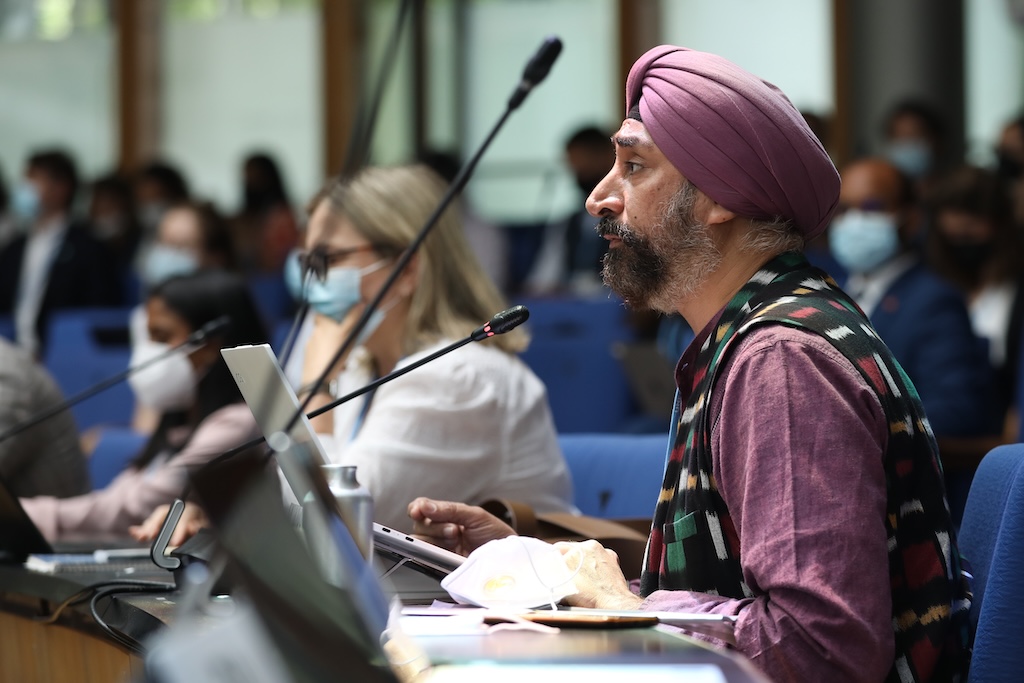
Dr Jennifer Allan: I’ve been researching the role of side events, pavilion activities and Global Climate Action Hub panels in the “expo” that now dominates COP space and participation opportunities. There has been a decided shift, from a smaller number of events focused on negotiation and implementation to a huge array of panels showcasing new initiatives or national actions. It is about what is new, not following up on what has been agreed. Side events and Global Climate Action Hub events could shift focus under the secretariat and the high-level champions. Pavilion spaces could be reserved for those who can demonstrate that their presence will advance climate action.
Sandrine Dixson-Declève: COPs must evolve from negotiation-heavy forums to more frequent, smaller, solution-focused meetings centred on progress and implementation, with broad stakeholder participation.
How could COP participation be improved?
Erika Lennon: Civil society, youth, Indigenous peoples, women, local communities and people with disabilities, among others, have increasingly faced shrinking civic space in the UNFCCC process. They have to fight to have their voices heard, to be present in the rooms where decisions happen, for access to information and open decision-making, and to assemble peacefully.
Shreeshan Venkatesh, global policy lead at Climate Action Network International: Structural barriers…undermine inclusivity and equitable participation in UNFCCC meetings, from the high cost of accommodation at COPs to discriminatory visa practices and shrinking civil society quotas. These barriers must be dismantled to ensure all parties and stakeholders can participate fully and on equal terms.
Erika Lennon: Parties should incorporate and support participation not only at COPs, but also in climate action and decisions on the ground. They can do this by creating space across all agenda items to hear from rightsholders and ensuring human rights and civic space are guaranteed during all negotiations.
Shreeshan Venkatesh: Civic space and freedoms are under threat, even at COPs. Host agreements must guarantee freedom of speech, assembly and accessibility, backed by an independent body to address violations.
How can COPs drive change outside the UN process?
Sandrine Dixson-Declève: COP must transform from a forum of negotiation to a platform of delivery, inclusion and accountability, anchoring climate action in the lived realities of people and the demands of science.
Kaveh Guilanpour: There should be a thorough and honest analysis of the value add of the UNFCCC process and what is best left to other fora.
Christiana Figueres: While some negotiations remain necessary, the most urgent action has shifted to implementation in the context of market forces and climate economics. There is no doubt that civil society, businesses, cities and communities are moving faster than governments. These actors, traditionally considered and labelled as mere “observers” in the formal UNFCCC space, have become the true engines of transformation. One could consider the pros and cons of creating a semi-detached “real world” space alongside COP – one that amplifies their progress, showcases innovation and feeds actionable insights back into the formal process.
Todd Stern: The Paris regime has a role to play in encouraging and tracking strong action outside its purview. This includes the public and private sectors working together on rapid decarbonisation and on unlocking the kind of large-scale investment needed for countries in the global south to build sustainable and resilient economies.
Shreeshan Venkatesh: The UNFCCC, and other multilateral fora that have become central to the formulation and implementation of climate policy and international cooperation, must align with international law. This includes the recent advisory opinions from the ICJ and the Inter-American Court of Justice, and the obligations they clearly lay out.
Claudio Angelo: [There is] a final, bigger problem, which no UNFCCC reform can solve: the climate regime is a child of the democratic world order and the lynchpin of that world order has become a rogue state. The rise of the far-right and the erosion of democracy are rendering multilateralism itself useless – a world that is unable to stop genocides in Gaza and Sudan can’t solve the climate crisis.
The post COP experts: How could the UN climate talks be reformed? appeared first on Carbon Brief.
Greenhouse Gases
DeBriefed 27 February 2026: Trump’s fossil-fuel talk | Modi-Lula rare-earth pact | Is there a UK ‘greenlash’?
Welcome to Carbon Brief’s DeBriefed.
An essential guide to the week’s key developments relating to climate change.
This week
Absolute State of the Union
‘DRILL, BABY’: US president Donald Trump “doubled down on his ‘drill, baby, drill’ agenda” in his State of the Union (SOTU) address, said the Los Angeles Times. He “tout[ed] his support of the fossil-fuel industry and renew[ed] his focus on electricity affordability”, reported the Financial Times. Trump also attacked the “green new scam”, noted Carbon Brief’s SOTU tracker.
COAL REPRIEVE: Earlier in the week, the Trump administration had watered down limits on mercury pollution from coal-fired power plants, reported the Financial Times. It remains “unclear” if this will be enough to prevent the decline of coal power, said Bloomberg, in the face of lower-cost gas and renewables. Reuters noted that US coal plants are “ageing”.
OIL STAY: The US Supreme Court agreed to hear arguments brought by the oil industry in a “major lawsuit”, reported the New York Times. The newspaper said the firms are attempting to head off dozens of other lawsuits at state level, relating to their role in global warming.
SHIP-SHILLING: The Trump administration is working to “kill” a global carbon levy on shipping “permanently”, reported Politico, after succeeding in delaying the measure late last year. The Guardian said US “bullying” could be “paying off”, after Panama signalled it was reversing its support for the levy in a proposal submitted to the UN shipping body.
Around the world
- RARE EARTHS: The governments of Brazil and India signed a deal on rare earths, said the Times of India, as well as agreeing to collaborate on renewable energy.
- HEAT ROLLBACK: German homes will be allowed to continue installing gas and oil heating, under watered-down government plans covered by Clean Energy Wire.
- BRAZIL FLOODS: At least 53 people died in floods in the state of Minas Gerais, after some areas saw 170mm of rain in a few hours, reported CNN Brasil.
- ITALY’S ATTACK: Italy is calling for the EU to “suspend” its emissions trading system (ETS) ahead of a review later this year, said Politico.
- COOKSTOVE CREDITS: The first-ever carbon credits under the Paris Agreement have been issued to a cookstove project in Myanmar, said Climate Home News.
- SAUDI SOLAR: Turkey has signed a “major” solar deal that will see Saudi firm ACWA building 2 gigawatts in the country, according to Agence France-Presse.
$467 billion
The profits made by five major oil firms since prices spiked following Russia’s invasion of Ukraine four years ago, according to a report by Global Witness covered by BusinessGreen.
Latest climate research
- Claims about the “fingerprint” of human-caused climate change, made in a recent US Department of Energy report, are “factually incorrect” | AGU Advances
- Large lakes in the Congo Basin are releasing carbon dioxide into the atmosphere from “immense ancient stores” | Nature Geoscience
- Shared Socioeconomic Pathways – scenarios used regularly in climate modelling – underrepresent “narratives explicitly centring on democratic principles such as participation, accountability and justice” | npj Climate Action
(For more, see Carbon Brief’s in-depth daily summaries of the top climate news stories on Monday, Tuesday, Wednesday, Thursday and Friday.)
Captured
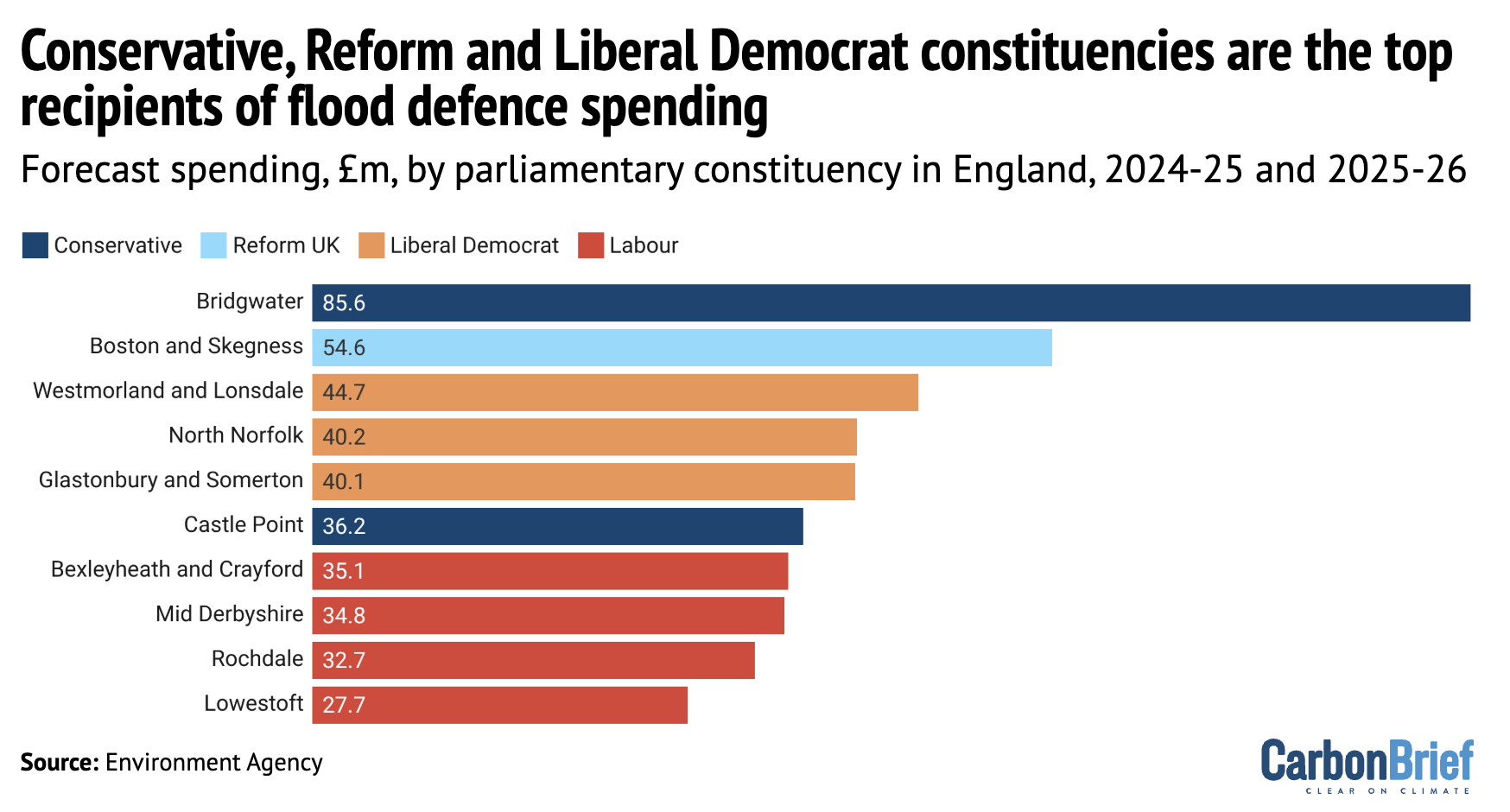
The constituency of Richard Tice MP, the climate-sceptic deputy leader of Reform UK, is the second-largest recipient of flood defence spending in England, according to new Carbon Brief analysis. Overall, the funding is disproportionately targeted at coastal and urban areas, many of which have Conservative or Liberal Democrat MPs.
Spotlight
Is there really a UK ‘greenlash’?
This week, after a historic Green Party byelection win, Carbon Brief looks at whether there really is a “greenlash” against climate policy in the UK.
Over the past year, the UK’s political consensus on climate change has been shattered.
Yet despite a sharp turn against climate action among right-wing politicians and right-leaning media outlets, UK public support for climate action remains strong.
Prof Federica Genovese, who studies climate politics at the University of Oxford, told Carbon Brief:
“The current ‘war’ on green policy is mostly driven by media and political elites, not by the public.”
Indeed, there is still a greater than two-to-one majority among the UK public in favour of the country’s legally binding target to reach net-zero emissions by 2050, as shown below.
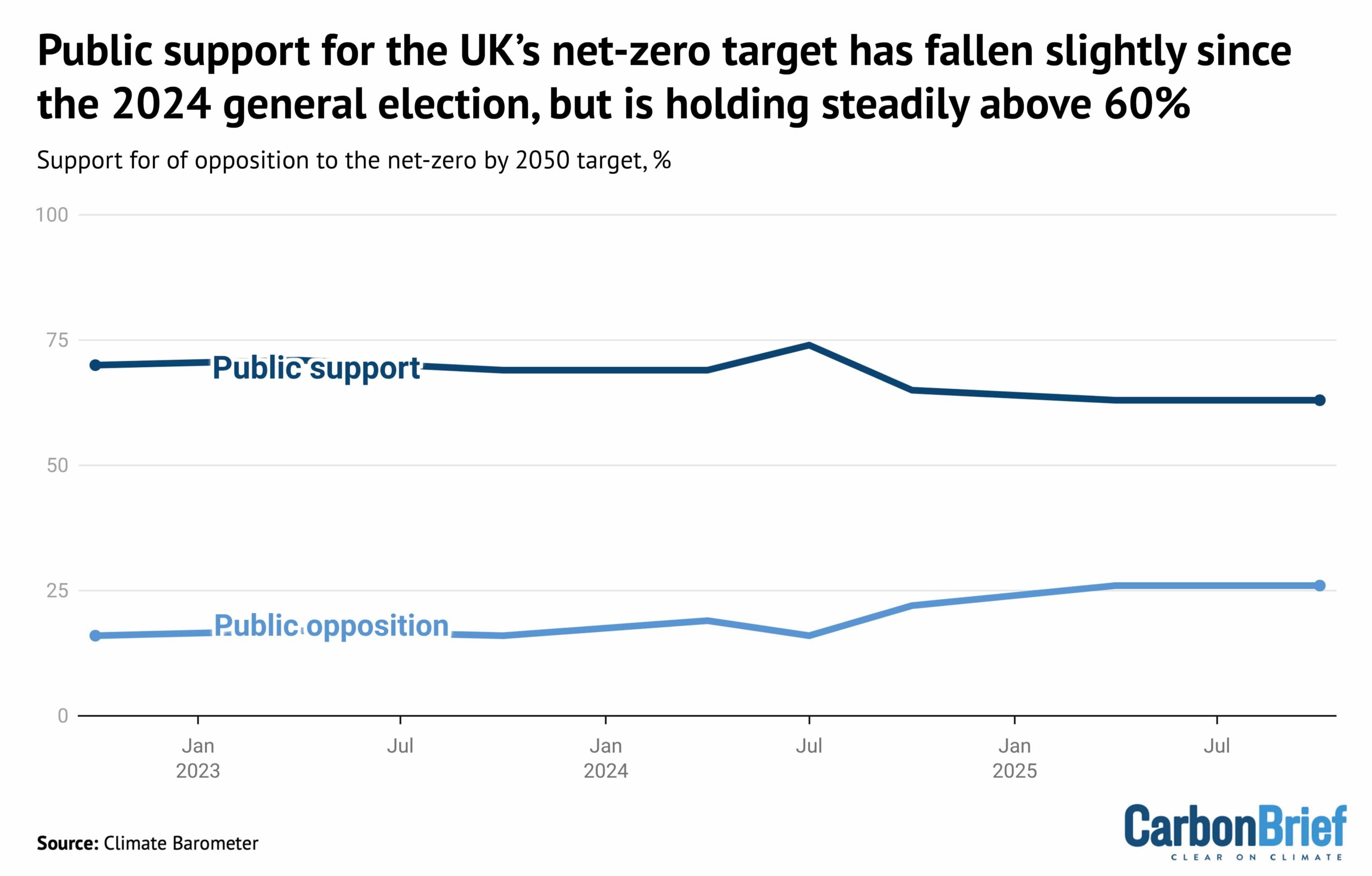
Steve Akehurst, director of public-opinion research initiative Persuasion UK, also noted the growing divide between the public and “elites”. He told Carbon Brief:
“The biggest movement is, without doubt, in media and elite opinion. There is a bit more polarisation and opposition [to climate action] among voters, but it’s typically no more than 20-25% and mostly confined within core Reform voters.”
Conservative gear shift
For decades, the UK had enjoyed strong, cross-party political support for climate action.
Lord Deben, the Conservative peer and former chair of the Climate Change Committee, told Carbon Brief that the UK’s landmark 2008 Climate Change Act had been born of this cross-party consensus, saying “all parties supported it”.
Since their landslide loss at the 2024 election, however, the Conservatives have turned against the UK’s target of net-zero emissions by 2050, which they legislated for in 2019.
Curiously, while opposition to net-zero has surged among Conservative MPs, there is majority support for the target among those that plan to vote for the party, as shown below.
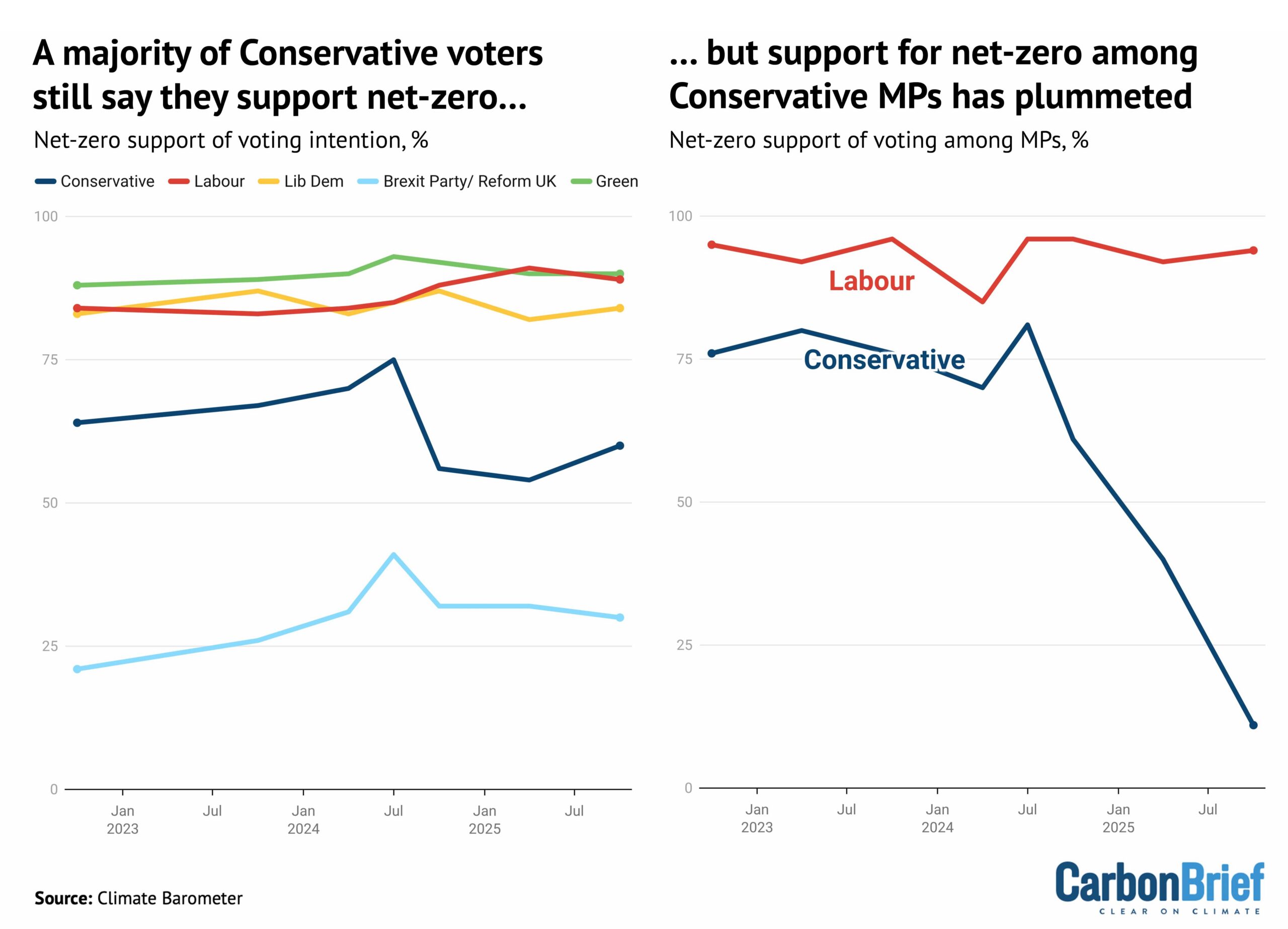
Dr Adam Corner, advisor to the Climate Barometer initiative that tracks public opinion on climate change, told Carbon Brief that those who currently plan to vote Reform are the only segment who “tend to be more opposed to net-zero goals”. He said:
“Despite the rise in hostile media coverage and the collapse of the political consensus, we find that public support for the net-zero by 2050 target is plateauing – not plummeting.”
Reform, which rejects the scientific evidence on global warming and campaigns against net-zero, has been leading the polls for a year. (However, it was comfortably beaten by the Greens in yesterday’s Gorton and Denton byelection.)
Corner acknowledged that “some of the anti-net zero noise…[is] showing up in our data”, adding:
“We see rising concerns about the near-term costs of policies and an uptick in people [falsely] attributing high energy bills to climate initiatives.”
But Akehurst said that, rather than a big fall in public support, there had been a drop in the “salience” of climate action:
“So many other issues [are] competing for their attention.”
UK newspapers published more editorials opposing climate action than supporting it for the first time on record in 2025, according to Carbon Brief analysis.
Global ‘greenlash’?
All of this sits against a challenging global backdrop, in which US president Donald Trump has been repeating climate-sceptic talking points and rolling back related policy.
At the same time, prominent figures have been calling for a change in climate strategy, sold variously as a “reset”, a “pivot”, as “realism”, or as “pragmatism”.
Genovese said that “far-right leaders have succeeded in the past 10 years in capturing net-zero as a poster child of things they are ‘fighting against’”.
She added that “much of this is fodder for conservative media and this whole ecosystem is essentially driving what we call the ‘greenlash’”.
Corner said the “disconnect” between elite views and the wider public “can create problems” – for example, “MPs consistently underestimate support for renewables”. He added:
“There is clearly a risk that the public starts to disengage too, if not enough positive voices are countering the negative ones.”
Watch, read, listen
TRUMP’S ‘PETROSTATE’: The US is becoming a “petrostate” that will be “sicker and poorer”, wrote Financial Times associate editor Rana Forohaar.
RHETORIC VS REALITY: Despite a “political mood [that] has darkened”, there is “more green stuff being installed than ever”, said New York Times columnist David Wallace-Wells.
CHINA’S ‘REVOLUTION’: The BBC’s Climate Question podcast reported from China on the “green energy revolution” taking place in the country.
Coming up
- 2-6 March: UN Food and Agriculture Organization regional conference for Latin America and Caribbean, Brasília
- 3 March: UK spring statement
- 4-11 March: China’s “two sessions”
- 5 March: Nepal elections
Pick of the jobs
- The Guardian, senior reporter, climate justice | Salary: $123,000-$135,000. Location: New York or Washington DC
- China-Global South Project, non-resident fellow, climate change | Salary: Up to $1,000 a month. Location: Remote
- University of East Anglia, PhD in mobilising community-based climate action through co-designed sports and wellbeing interventions | Salary: Stipend (unknown amount). Location: Norwich, UK
- TABLE and the University of São Paulo, Brazil, postdoctoral researcher in food system narratives | Salary: Unknown. Location: Pirassununga, Brazil
DeBriefed is edited by Daisy Dunne. Please send any tips or feedback to debriefed@carbonbrief.org.
This is an online version of Carbon Brief’s weekly DeBriefed email newsletter. Subscribe for free here.
The post DeBriefed 27 February 2026: Trump’s fossil-fuel talk | Modi-Lula rare-earth pact | Is there a UK ‘greenlash’? appeared first on Carbon Brief.
Greenhouse Gases
Analysis: Constituency of Reform’s climate-sceptic Richard Tice gets £55m flood funding
The Lincolnshire constituency held by Richard Tice, the climate-sceptic deputy leader of the hard-right Reform party, has been pledged at least £55m in government funding for flood defences since 2024.
This investment in Boston and Skegness is the second-largest sum for a single constituency from a £1.4bn flood-defence fund for England, Carbon Brief analysis shows.
Flooding is becoming more likely and more extreme in the UK due to climate change.
Yet, for years, governments have failed to spend enough on flood defences to protect people, properties and infrastructure.
The £1.4bn fund is part of the current Labour government’s wider pledge to invest a “record” £7.9bn over a decade on protecting hundreds of thousands of homes and businesses from flooding.
As MP for one of England’s most flood-prone regions, Tice has called for more investment in flood defences, stating that “we cannot afford to ‘surrender the fens’ to the sea”.
He is also one of Reform’s most vocal opponents of climate action and what he calls “net stupid zero”. He denies the scientific consensus on climate change and has claimed, falsely and without evidence, that scientists are “lying”.
Flood defences
Last year, the government said it would invest £2.65bn on flood and coastal erosion risk management (FCERM) schemes in England between April 2024 and March 2026.
This money was intended to protect 66,500 properties from flooding. It is part of a decade-long Labour government plan to spend more than £7.9bn on flood defences.
There has been a consistent shortfall in maintaining England’s flood defences, with the Environment Agency expecting to protect fewer properties by 2027 than it had initially planned.
The Climate Change Committee (CCC) has attributed this to rising costs, backlogs from previous governments and a lack of capacity. It also points to the strain from “more frequent and severe” weather events, such as storms in recent years that have been amplified by climate change.
However, the CCC also said last year that, if the 2024-26 spending programme is delivered, it would be “slightly closer to the track” of the Environment Agency targets out to 2027.
The government has released constituency-level data on which schemes in England it plans to fund, covering £1.4bn of the 2024-26 investment. The other half of the FCERM spending covers additional measures, from repairing existing defences to advising local authorities.
The map below shows the distribution of spending on FCERM schemes in England over the past two years, highlighting the constituency of Richard Tice.
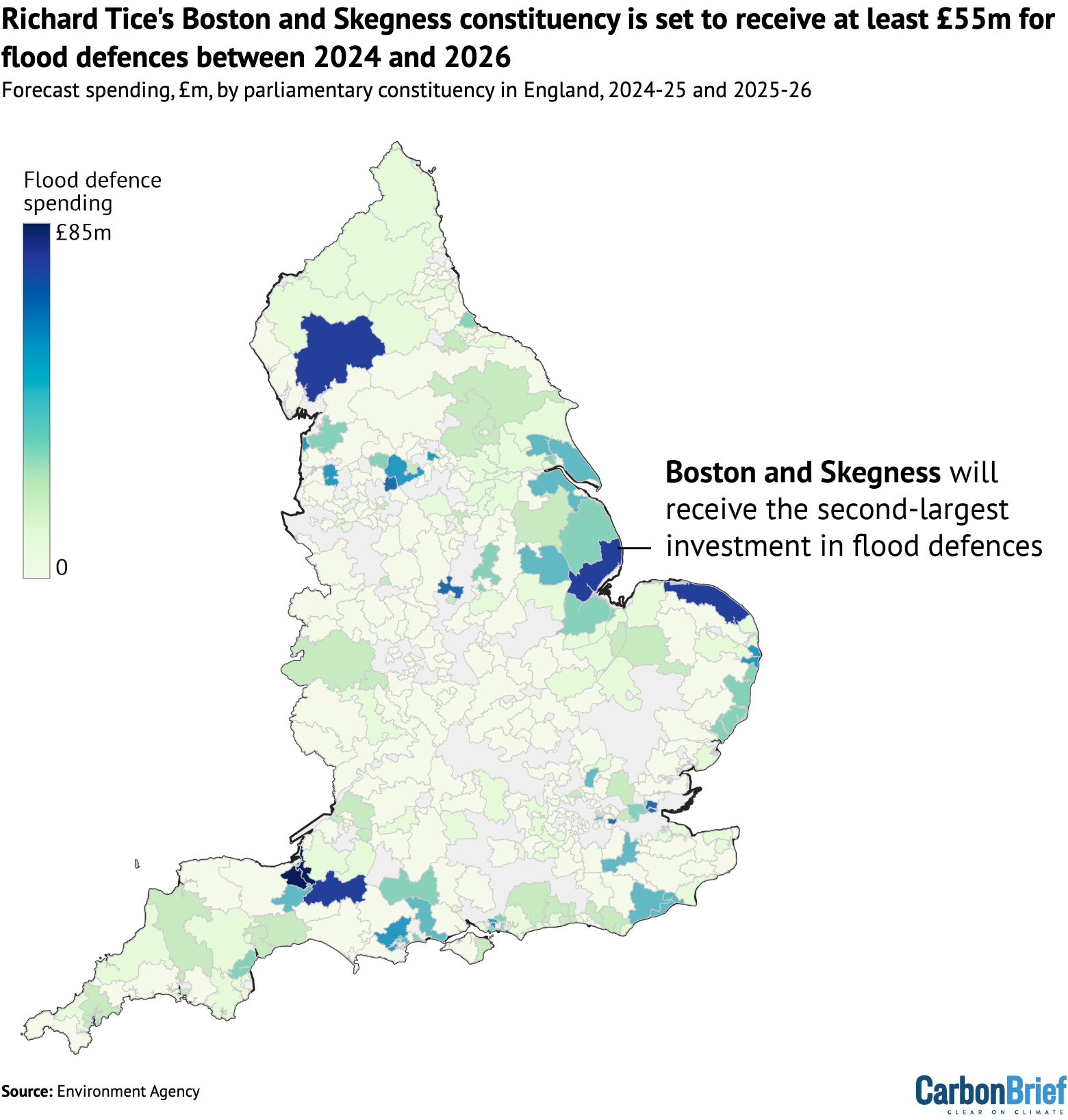
By far the largest sum of money – £85.6m in total – has been committed to a tidal barrier and various other defences in the Somerset constituency of Bridgwater, the seat of Conservative MP Ashley Fox.
Over the first months of 2026, the south-west region has faced significant flooding and Fox has called for more support from the government, citing “climate patterns shifting and rainfall intensifying”.
He has also backed his party’s position that “the 2050 net-zero target is impossible” and called for more fossil-fuel extraction in the North Sea.
Tice’s east-coast constituency of Boston and Skegness, which is highly vulnerable to flooding from both rivers and the sea, is set to receive £55m. Among the supported projects are beach defences from Saltfleet to Gibraltar Point and upgrades to pumping stations.
Overall, Boston and Skegness has the second-largest portion of flood-defence funding, as the chart below shows. Constituencies with Conservative and Liberal Democrat MPs occupied the other top positions.
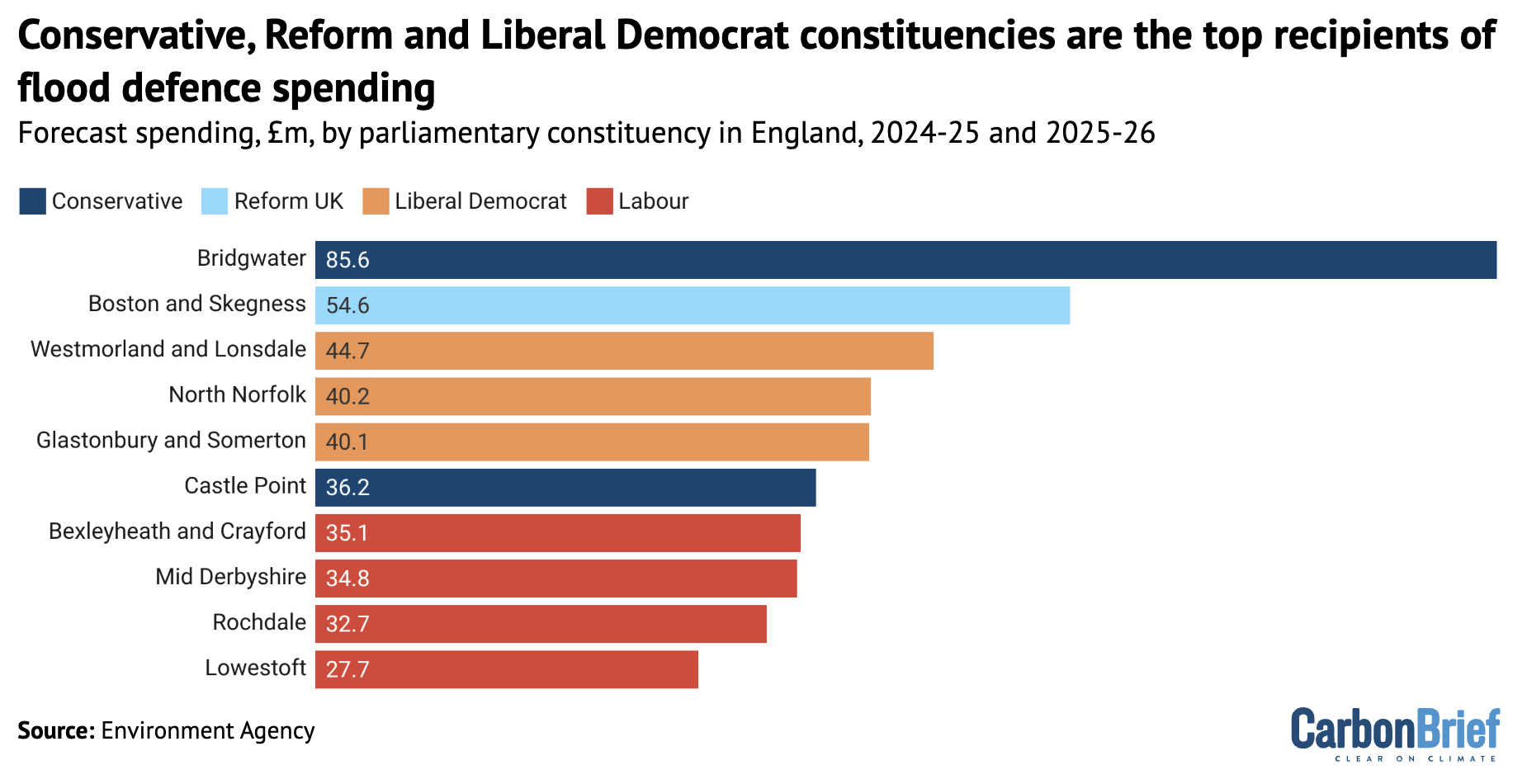
Overall, despite Labour MPs occupying 347 out of England’s 543 constituencies – nearly two-thirds of the total – more than half of the flood-defence funding was distributed to constituencies with non-Labour MPs. This reflects the flood risk in coastal and rural areas that are not traditional Labour strongholds.
Reform funding
While Reform has just eight MPs, representing 1% of the population, its constituencies have been assigned 4% of the flood-defence funding for England.
Nearly all of this money was for Tice’s constituency, although party leader Nigel Farage’s coastal Clacton seat in Kent received £2m.
Reform UK is committed to “scrapping net-zero” and its leadership has expressed firmly climate-sceptic views.
Much has been made of the disconnect between the party’s climate policies and the threat climate change poses to its voters. Various analyses have shown the flood risk in Reform-dominated areas, particularly Lincolnshire.
Tice has rejected climate science, advocated for fossil-fuel production and criticised Environment Agency flood-defence activities. Yet, he has also called for more investment in flood defences, stating that “we cannot afford to ‘surrender the fens’ to the sea”.
This may reflect Tice’s broader approach to climate change. In a 2024 interview with LBC, he said:
“Where you’ve got concerns about sea level defences and sea level rise, guess what? A bit of steel, a bit of cement, some aggregate…and you build some concrete sea level defences. That’s how you deal with rising sea levels.”
While climate adaptation is viewed as vital in a warming world, there are limits on how much societies can adapt and adaptation costs will continue to increase as emissions rise.
The post Analysis: Constituency of Reform’s climate-sceptic Richard Tice gets £55m flood funding appeared first on Carbon Brief.
Analysis: Constituency of Reform’s climate-sceptic Richard Tice gets £55m flood funding
Greenhouse Gases
Cropped 25 February 2026: Food inflation strikes | El Niño looms | Biodiversity talks stagnate
We handpick and explain the most important stories at the intersection of climate, land, food and nature over the past fortnight.
This is an online version of Carbon Brief’s fortnightly Cropped email newsletter.
Subscribe for free here.
Key developments
Food inflation on the rise
DELUGE STRIKES FOOD: Extreme rainfall and flooding across the Mediterranean and north Africa has “battered the winter growing regions that feed Europe…threatening food price rises”, reported the Financial Times. Western France has “endured more than 36 days of continuous rain”, while farmers’ associations in Spain’s Andalusia estimate that “20% of all production has been lost”, it added. Policy expert David Barmes told the paper that the “latest storms were part of a wider pattern of climate shocks feeding into food price inflation”.
-
Sign up to Carbon Brief’s free “Cropped” email newsletter. A fortnightly digest of food, land and nature news and views. Sent to your inbox every other Wednesday.
NO BEEF: The UK’s beef farmers, meanwhile, “face a double blow” from climate change as “relentless rain forces them to keep cows indoors”, while last summer’s drought hit hay supplies, said another Financial Times article. At the same time, indoor growers in south England described a 60% increase in electricity standing charges as a “ticking timebomb” that could “force them to raise their prices or stop production, which will further fuel food price inflation”, wrote the Guardian.
‘TINDERBOX’ AND TARIFFS: A study, covered by the Guardian, warned that major extreme weather and other “shocks” could “spark social unrest and even food riots in the UK”. Experts cited “chronic” vulnerabilities, including climate change, low incomes, poor farming policy and “fragile” supply chains that have made the UK’s food system a “tinderbox”. A New York Times explainer noted that while trade could once guard against food supply shocks, barriers such as tariffs and export controls – which are being “increasingly” used by politicians – “can shut off that safety valve”.
El Niño looms
NEW ENSO INDEX: Researchers have developed a new index for calculating El Niño, the large-scale climate pattern that influences global weather and causes “billions in damages by bringing floods to some regions and drought to others”, reported CNN. It added that climate change is making it more difficult for scientists to observe El Niño patterns by warming up the entire ocean. The outlet said that with the new metric, “scientists can now see it earlier and our long-range weather forecasts will be improved for it.”
WARMING WARNING: Meanwhile, the US Climate Prediction Center announced that there is a 60% chance of the current La Niña conditions shifting towards a neutral state over the next few months, with an El Niño likely to follow in late spring, according to Reuters. The Vibes, a Malaysian news outlet, quoted a climate scientist saying: “If the El Niño does materialise, it could possibly push 2026 or 2027 as the warmest year on record, replacing 2024.”
CROP IMPACTS: Reuters noted that neutral conditions lead to “more stable weather and potentially better crop yields”. However, the newswire added, an El Niño state would mean “worsening drought conditions and issues for the next growing season” to Australia. El Niño also “typically brings a poor south-west monsoon to India, including droughts”, reported the Hindu’s Business Line. A 2024 guest post for Carbon Brief explained that El Niño is linked to crop failure in south-eastern Africa and south-east Asia.
News and views
- DAM-AG-ES: Several South Korean farmers filed a lawsuit against the country’s state-owned utility company, “seek[ing] financial compensation for climate-related agricultural damages”, reported United Press International. Meanwhile, a national climate change assessment for the Philippines found that the country “lost up to $219bn in agricultural damages from typhoons, floods and droughts” over 2000-10, according to Eco-Business.
- SCORCHED GRASS: South Africa’s Western Cape province is experiencing “one of the worst droughts in living memory”, which is “scorching grass and killing livestock”, said Reuters. The newswire wrote: “In 2015, a drought almost dried up the taps in the city; farmers say this one has been even more brutal than a decade ago.”
- NOUVELLE VEG: New guidelines published under France’s national food, nutrition and climate strategy “urged” citizens to “limit” their meat consumption, reported Euronews. The delayed strategy comes a month after the US government “upended decades of recommendations by touting consumption of red meat and full-fat dairy”, it noted.
- COURTING DISASTER: India’s top green court accepted the findings of a committee that “found no flaws” in greenlighting the Great Nicobar project that “will lead to the felling of a million trees” and translocating corals, reported Mongabay. The court found “no good ground to interfere”, despite “threats to a globally unique biodiversity hotspot” and Indigenous tribes at risk of displacement by the project, wrote Frontline.
- FISH FALLING: A new study found that fish biomass is “falling by 7.2% from as little as 0.1C of warming per decade”, noted the Guardian. While experts also pointed to the role of overfishing in marine life loss, marine ecologist and study lead author Dr Shahar Chaikin told the outlet: “Our research proves exactly what that biological cost [of warming] looks like underwater.”
- TOO HOT FOR COFFEE: According to new analysis by Climate Central, countries where coffee beans are grown “are becoming too hot to cultivate them”, reported the Guardian. The world’s top five coffee-growing countries faced “57 additional days of coffee-harming heat” annually because of climate change, it added.
Spotlight
Nature talks inch forward
This week, Carbon Brief covers the latest round of negotiations under the UN Convention on Biological Diversity (CBD), which occurred in Rome over 16-19 February.
The penultimate set of biodiversity negotiations before October’s Conference of the Parties ended in Rome last week, leaving plenty of unfinished business.
The CBD’s subsidiary body on implementation (SBI) met in the Italian capital for four days to discuss a range of issues, including biodiversity finance and reviewing progress towards the nature targets agreed under the Kunming-Montreal Global Biodiversity Framework (GBF).
However, many of the major sticking points – particularly around finance – will have to wait until later this summer, leaving some observers worried about the capacity for delegates to get through a packed agenda at COP17.
The SBI, along with the subsidiary body on scientific, technical and technological advice (SBSTTA) will both meet in Nairobi, Kenya, later this summer for a final round of talks before COP17 kicks off in Yerevan, Armenia, on 19 October.
Money talks
Finance for nature has long been a sticking point at negotiations under the CBD.
Discussions on a new fund for biodiversity derailed biodiversity talks in Cali, Colombia, in autumn 2024, requiring resumed talks a few months later.
Despite this, finance was barely on the agenda at the SBI meetings in Rome. Delegates discussed three studies on the relationship between debt sustainability and implementation of nature plans, but the more substantive talks are set to take place at the next SBI meeting in Nairobi.
Several parties “highlighted concerns with the imbalance of work” on finance between these SBI talks and the next ones, reported Earth Negotiations Bulletin (ENB).
Lim Li Ching, senior researcher at Third World Network, noted that tensions around finance permeated every aspect of the talks. She told Carbon Brief:
“If you’re talking about the gender plan of action – if there’s little or no financial resources provided to actually put it into practice and implement it, then it’s [just] paper, right? Same with the reporting requirements and obligations.”
Monitoring and reporting
Closely linked to the issue of finance is the obligations of parties to report on their progress towards the goals and targets of the GBF.
Parties do so through the submission of national reports.
Several parties at the talks pointed to a lack of timely funding for driving delays in their reporting, according to ENB.
A note released by the CBD Secretariat in December said that no parties had submitted their national reports yet; by the time of the SBI meetings, only the EU had. It further noted that just 58 parties had submitted their national biodiversity plans, which were initially meant to be published by COP16, in October 2024.
Linda Krueger, director of biodiversity and infrastructure policy at the environmental not-for-profit Nature Conservancy, told Carbon Brief that despite the sparse submissions, parties are “very focused on the national report preparation”. She added:
“Everybody wants to be able to show that we’re on the path and that there still is a pathway to getting to 2030 that’s positive and largely in the right direction.”
Watch, read, listen
NET LOSS: Nigeria’s marine life is being “threatened” by “ghost gear” – nets and other fishing equipment discarded in the ocean – said Dialogue Earth.
COMEBACK CAUSALITY: A Vox long-read looked at whether Costa Rica’s “payments for ecosystem services” programme helped the country turn a corner on deforestation.
HOMEGROWN GOALS: A Straits Times podcast discussed whether import-dependent Singapore can afford to shelve its goal to produce 30% of its food locally by 2030.
‘RUSTING’ RIVERS: The Financial Times took a closer look at a “strange new force blighting the [Arctic] landscape”: rivers turning rust-orange due to global warming.
New science
- Lakes in the Congo Basin’s peatlands are releasing carbon that is thousands of years old | Nature Geoscience
- Natural non-forest ecosystems – such as grasslands and marshlands – were converted for agriculture at four times the rate of land with tree cover between 2005 and 2020 | Proceedings of the National Academy of Sciences
- Around one-quarter of global tree-cover loss over 2001-22 was driven by cropland expansion, pastures and forest plantations for commodity production | Nature Food
In the diary
- 2-6 March: UN Food and Agriculture Organization regional conference for Latin America and Caribbean | Brasília
- 5 March: Nepal general elections
- 9-20 March: First part of the thirty-first session of the International Seabed Authority (ISA) | Kingston, Jamaica
Cropped is researched and written by Dr Giuliana Viglione, Aruna Chandrasekhar, Daisy Dunne, Orla Dwyer and Yanine Quiroz.
Please send tips and feedback to cropped@carbonbrief.org
The post Cropped 25 February 2026: Food inflation strikes | El Niño looms | Biodiversity talks stagnate appeared first on Carbon Brief.
Cropped 25 February 2026: Food inflation strikes | El Niño looms | Biodiversity talks stagnate
-
Greenhouse Gases7 months ago
Guest post: Why China is still building new coal – and when it might stop
-
Climate Change7 months ago
Guest post: Why China is still building new coal – and when it might stop
-

 Greenhouse Gases2 years ago
Greenhouse Gases2 years ago嘉宾来稿:满足中国增长的用电需求 光伏加储能“比新建煤电更实惠”
-
Climate Change2 years ago
Bill Discounting Climate Change in Florida’s Energy Policy Awaits DeSantis’ Approval
-
Climate Change2 years ago
Spanish-language misinformation on renewable energy spreads online, report shows
-

 Climate Change2 years ago
Climate Change2 years ago嘉宾来稿:满足中国增长的用电需求 光伏加储能“比新建煤电更实惠”
-
Climate Change Videos2 years ago
The toxic gas flares fuelling Nigeria’s climate change – BBC News
-

 Carbon Footprint2 years ago
Carbon Footprint2 years agoUS SEC’s Climate Disclosure Rules Spur Renewed Interest in Carbon Credits










